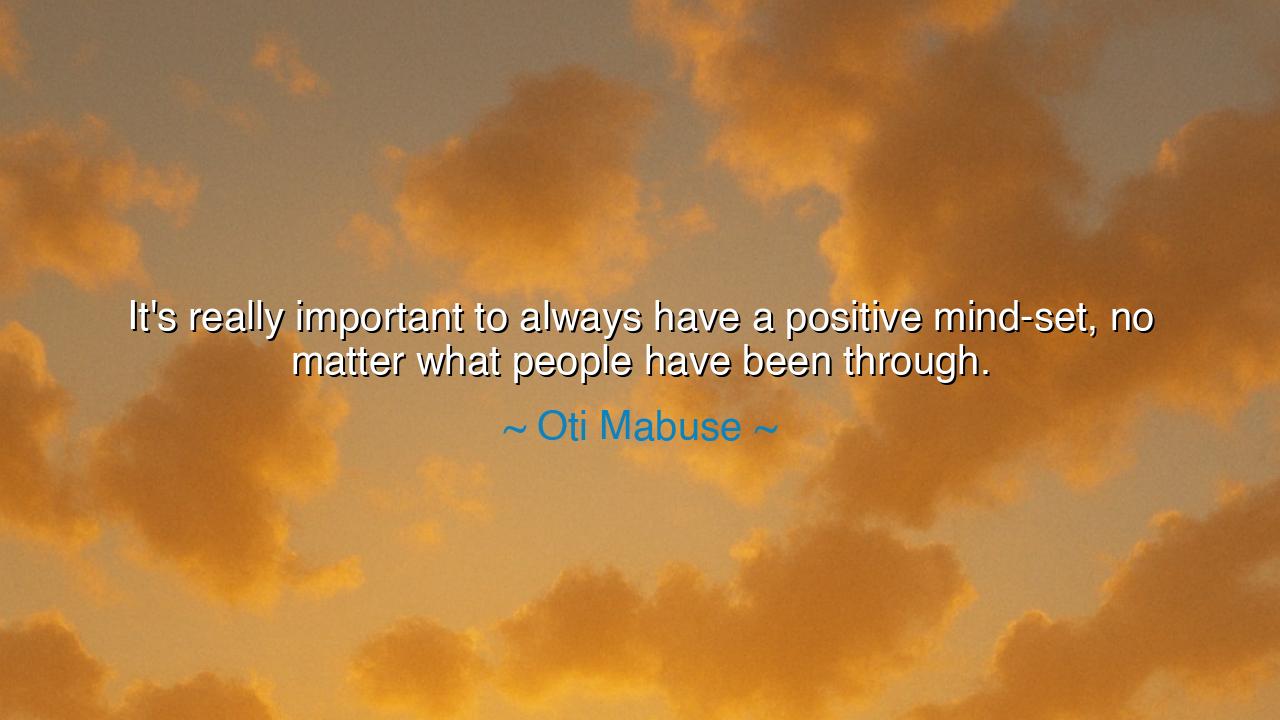
It's really important to always have a positive mind-set, no
It's really important to always have a positive mind-set, no matter what people have been through.






When Oti Mabuse declared, “It’s really important to always have a positive mind-set, no matter what people have been through,” she gave voice to a truth that has carried humanity through storms, wars, and generations of hardship. Her words remind us that suffering and trial are universal, but so too is the power of the mind to rise above them. To keep a positive mind-set is not to deny pain, but to refuse to let it define us. It is to say: “I have endured, yet I will still hope.”
The ancients themselves understood this. The Stoic philosopher Epictetus, once a slave, declared that while his body could be shackled, his mind remained free. Though he had been through humiliation and chains, his mind-set remained untouchable, anchored in hope and clarity. His example echoes Mabuse’s wisdom: no matter what one has endured, the mind can either bow to despair or stand as a fortress of positivity.
History offers a luminous example in Nelson Mandela, who spent twenty-seven years in prison, separated from his people and his family. He had every reason to let bitterness consume him. Yet he chose instead a positive mind-set, dreaming of reconciliation and unity rather than vengeance. When at last he was free, his hope and optimism transformed not only his own destiny but that of a nation. Mandela’s life reveals that the mind, when filled with positivity, can turn even the darkest suffering into a foundation for greatness.
Mabuse’s words also carry a warning: life does not spare anyone from trial. All people “have been through” something — heartbreak, betrayal, failure, or loss. But these trials alone do not define the worth of a life. What defines it is how we respond. The positive mind-set becomes the dividing line between those who collapse under weight and those who grow stronger because of it.
At the heart of this teaching lies resilience. A positive mind does not erase sorrow, but it gives the strength to carry it with dignity. It turns wounds into wisdom and burdens into stepping-stones. To cultivate such a mind is to practice gratitude in hardship, courage in fear, and hope when all else seems hopeless. It is to declare, like the heroes of old, “Though I fall, I will rise again.”
The lesson for us is clear: train your mind daily to see light even in shadow. Begin with gratitude for what you still have, however small. When trial comes, resist the temptation to ask “Why me?” and instead ask, “How can I grow through this?” Surround yourself with voices that uplift, and guard your heart from those who would drown you in despair. This is the discipline of a positive mind-set, a discipline more powerful than wealth or status.
In practice, this means weaving positivity into the rhythm of daily life. Speak encouraging words to yourself and to others. Reflect on past hardships you have survived, and let them remind you of your strength. Choose stories, music, and companions that inspire hope rather than fear. And when difficulties arise, let your first instinct be to search for possibility rather than defeat.
Therefore, let us carry Oti Mabuse’s wisdom: always have a positive mind-set, no matter what you have been through. For life will test us all, but the mind that clings to hope becomes unbreakable. With positivity as your compass, you will endure storms, rise from ashes, and shine as a beacon for those who follow.






MMaimaimai
I feel motivated by this quote, but it also makes me question cultural pressures around positivity. Could always striving to be positive create unrealistic expectations or stress, especially for those dealing with trauma? I’d like perspectives on how to encourage a positive mindset while also honoring and processing difficult emotions, and how such balance can contribute to long-term mental and emotional well-being.
KYKha Y
Reading this makes me reflect on the broader role of positivity in personal growth and relationships. Does focusing on maintaining a positive mindset help individuals navigate adversity more effectively, or could it unintentionally minimize their struggles? I’m curious about the psychological research behind optimism and resilience, and whether a positive outlook can genuinely influence outcomes in the face of serious challenges.
DTViet Dung Tran
This statement highlights the power of attitude, but it raises questions about its practical application. How can someone cultivate a positive mindset when life circumstances are challenging or overwhelming? Are there specific strategies or exercises that help sustain positivity without ignoring the realities of pain and hardship? I’d like to explore ways to foster resilience while still validating difficult experiences.
NHHa Ngoc Huy
I find this sentiment inspiring because it emphasizes resilience and maintaining optimism. But I also wonder, is it realistic to always have a positive mindset, especially after traumatic experiences? Could insisting on positivity sometimes suppress valid emotions or make people feel guilty for struggling? I’d like perspectives on how to balance maintaining a hopeful outlook with acknowledging and processing past difficulties effectively.